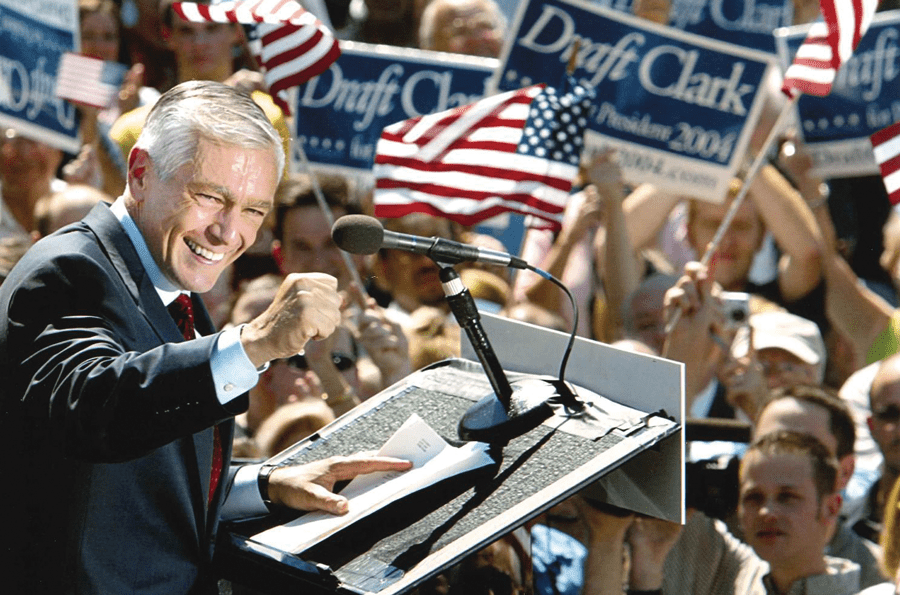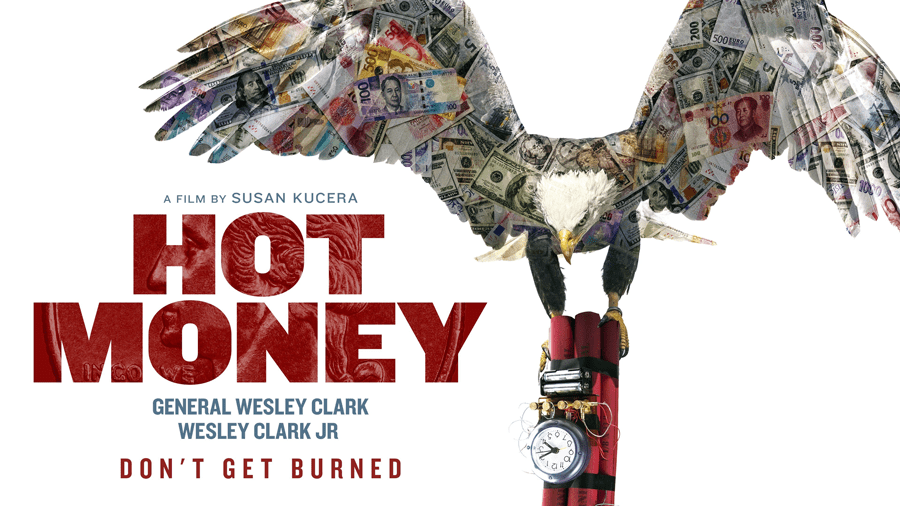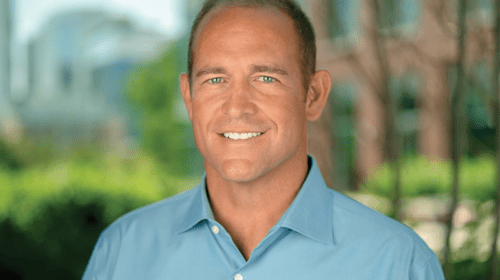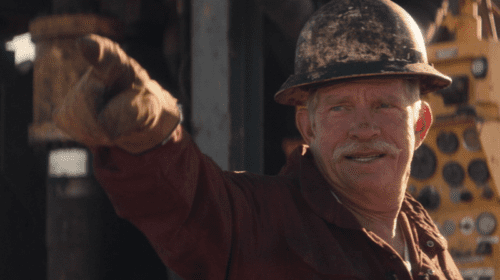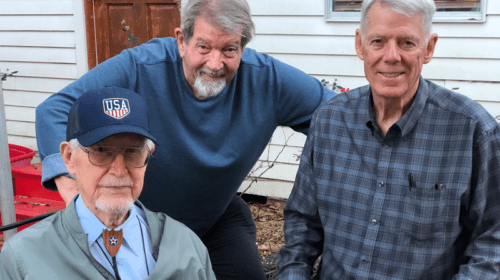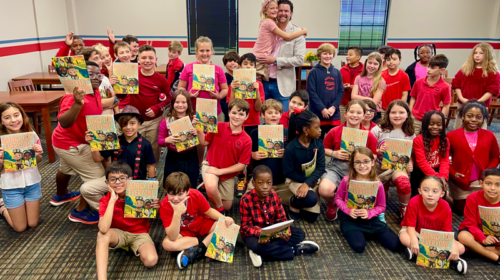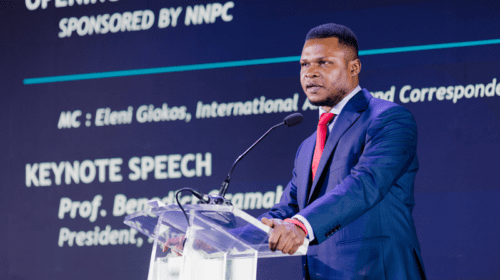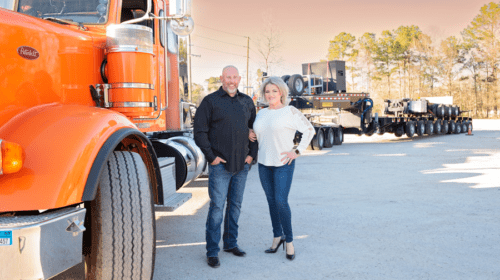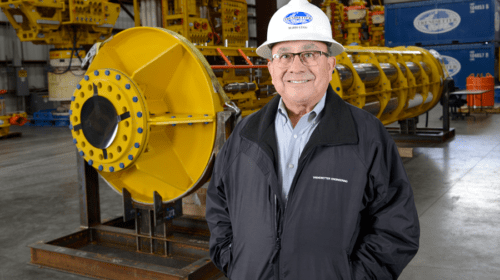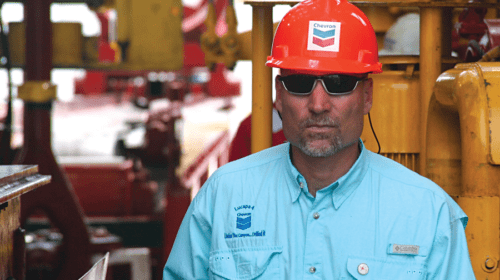“The filmmakers said, ‘We need a straight man and we need a young rebel. Then, we need a conservative voice of an older generation, and let’s make it really fun – let’s have it father versus son – or son versus father,’” says retired four-star general Wesley Kanne Clark of his involvement with the 2021 documentary Hot Money, in which he and his son, Wes Jr., figure prominently and engage in some verbal sparring as they debate the economic forces affecting climate change.
Hot Money was not General Clark’s acting debut. Three years earlier, he had appeared in the 2018 documentary, Living in the Future’s Past, described as a “meditative journey through climate change,” which was also directed by Susan Kucera, and co-produced and narrated by actor and environmental activist Jeff Bridges.
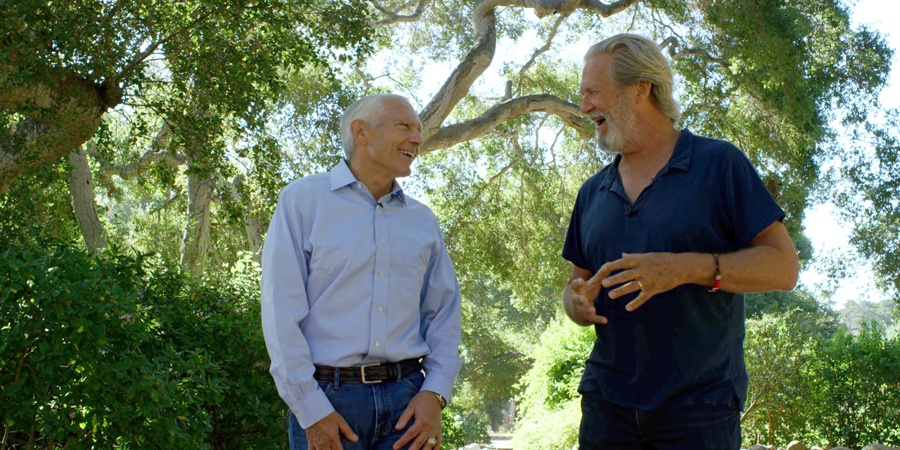
In his first appearance in Hot Money, summarized in the synopsis as a “journey through the complicated realities of our financial system and its profound exposure to climate change,” Clark says, “This is the great challenge of our time, dealing with the human impact on the environment and what it means in terms of our civilization going forward.”
During our interview in late September, he elaborates by saying, “Climate change is one of the toughest problems for democracy because it’s about the future. You have to take action today and you can’t see the results for years.”
Clark, who spent 38 years in the U.S. Army, culminating in his role as Supreme Allied Commander of NATO, doesn’t describe himself as a military man, but as a “national security guy,” and in Hot Money says to his son, Wes., Jr., “That’s what I’ve spent my life working on, trying to protect America, the Constitution, the way we live, and our futures for our children and grandchildren.” According to Clark, energy security is national security.
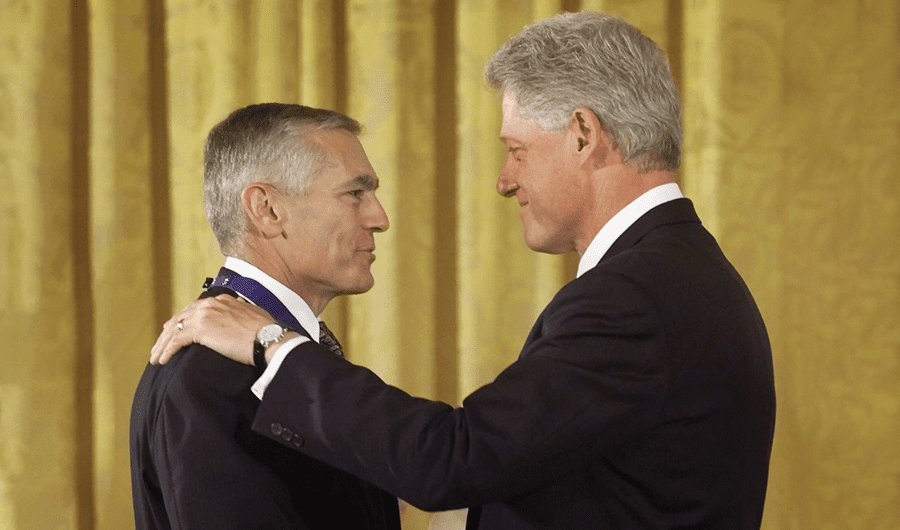
Dawning Realization
This first became evident to the American public amid the 1973-74 Arab oil embargo, which was implemented in retaliation for the U.S. decision to re-arm Israel during the 1973 Arab-Israeli War.
“Back in the 1960s, as we were transitioning from an oil exporting country to an oil importing country, we actually allowed a cartel – OPEC – to be established.” (Founded in Baghdad in September 1960, the five original members were Iran, Iraq, Kuwait, Saudi Arabia and Venezuela.)
As the U.S. propped up the Shah of Iran, who would be deposed in 1979, he agitated for an increase in the price of oil – and prices skyrocketed at the gas pump. “This forced not only worldwide inflation, but stagflation, through successive oil price hikes in the 1970s,” Clark explains. “It discombobulated the whole world and it’s when we first began to realize that energy security is national security.”
That dawning realization led to the formation in 1974 of what would officially become the Energy Information Administration (EIA) in 1977, in order to record global crude oil production, and the creation of the Strategic Petroleum Reserve in 1975, along with the establishment of the Department of Energy in 1977, as well as increased investments in energy research.
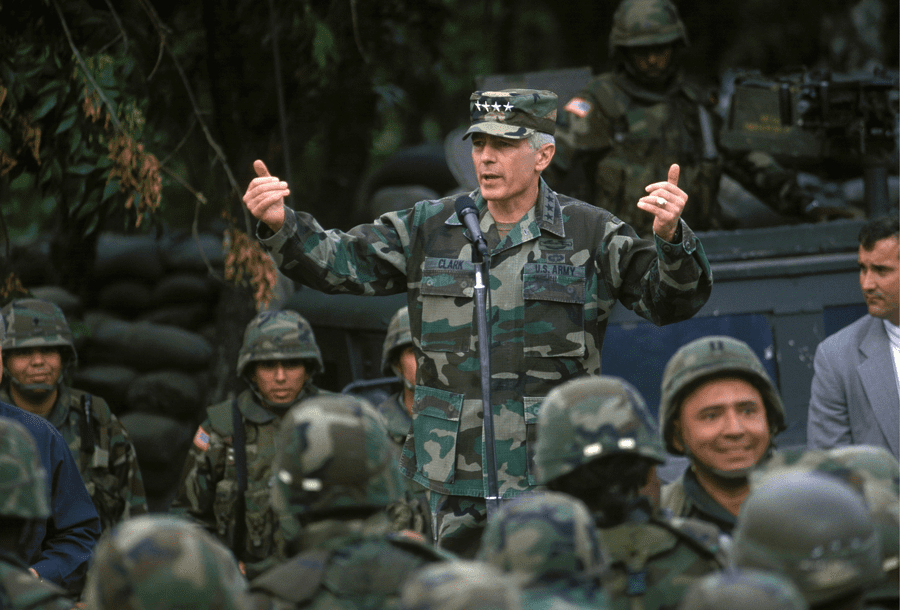
Market Vicissitudes
“Then, in 1998 [West Texas Intermediate (WTI)] oil prices dropped to a [year-end] low of [$10.82] a barrel and so all that was thrown out,” Clark says. While some scholars debate whether the growth of China’s emerging economy caused the price of oil to rise, suddenly oil price hikes started again in 2003 and, by July of 2008, WTI spiked at a record high of $145.16/bbl. [Source: https://www.eia.gov/dnav/pet/hist/RWTCD.htm]
“When we came into the fracking era of hydrocarbons, America became the number one oil producing country in the world,” Clark says, until once again the price fell with another downturn in 2008.
“The vicissitudes of the market have been hard on American energy security,” Clark says bluntly. “You can have the market or you can have energy security; you can’t have the energy security and development without the free market. Other countries have tried fracking without it and they failed.”
Clark recalls being in China in 2014 when he met with the head of Sinopec, one of China’s three national oil companies (NOCs), and was told the Chinese were not going to buy LNG from Clark’s business venture because of their belief that they would be cut off. Instead, he was informed, they would produce their own LNG by committing $250 billion to fracking, which was destined to fail, at the time, due to the lack of access to large sources of water required for fracking, among other issues. (A mere four years later, China was in the midst of a fracking boom.)
“The big thing was not the technology,” Clark says, “it was the psychology. Private ownership of mineral rights, along with relatively free markets, and people willing to invest and take risks, are what develop new technologies in areas like hydrocarbons. China didn’t have that.”

No Fracking Allowed
Clark was on the board of what he calls a “small fracking company” that was conducting exploration on land in Poland and had found commercial gas shows at 4,700 meters, but in Poland, as so many other countries aside from the U.S., the mineral rights are owned by the state. Because the mayor of the area saw no personal benefit in allowing them to frack, he accused them of ruining the farmland and told Clark they should leave.
“There was an extreme hostility,” he says, whereas fracking was welcomed in Arkansas, where Clark lives. Given the cyclical nature of the industry, the price of natural gas eventually dropped and there was talk of Peak Oil in 2005. The following year, fracking began expanding outside of Texas and into Arkansas and Louisiana, and later the rest of the country. “That’s energy security,” Clark says. “We have it. We know what it is now. Not everybody has it. In fact, the environmental movement in Europe has been pretty strong against fracking, but [it] is also serving Russian interests.”
Clark’s company had land in Spain that he says “was as good as anything in the Bakken Shale,” but the Spanish government wouldn’t permit fracking. It was the same story in Germany. “If [Spain] had permitted that, if France had permitted it, if Germany had, there would be no problem today with energy security in Ukraine, but creating an energy deficit in Western Europe served the interest of Mr. Putin; he saw it clearly 15 years ago and went after it.”
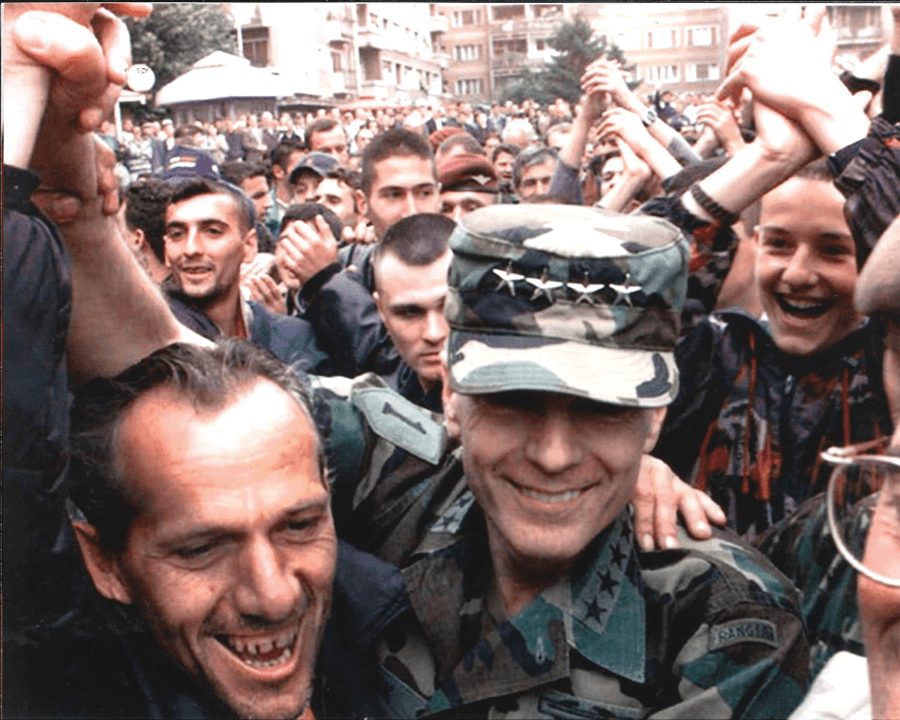
Competitive Struggle
Clark makes a bold statement: “On energy, [the U.S. is] completely self-sufficient.” Acknowledging that the country has abundant hydrocarbons, he counters that it also has abundant solar, although wind has proven less reliable and not as profitable.
According to Clark, to fully utilize alternative forms of energy, such as solar, “We need two trillion dollars of investment in the grid. More than that, we have a problem with the structure of the utility industry; it’s vulnerable to cyberattack.” While emphasizing that grid resilience is a major issue, he is sharply critical of the labyrinthine structure of the industry, calling it “probably the most complicated machine ever devised by mankind.”
“It’s a competitive struggle. There’s no “master planning,” so that’s an energy adequacy and an energy security problem.” He mentions advertisements for electric cars that urge consumers to ‘go green,’ and, while he is in favor of that, he points to the fact that the majority of electricity is produced from hydrocarbons. (According to the EIA, 60.8 percent of utility-scale electricity is generated from fossil fuels.)
Generational Perspectives
Clark and his son, Wes, Jr., are both advocates for clean energy, although Clark says, “I think he really did believe – and maybe still does – that climate change is going to happen much faster than we anticipate,” and admits that they differ in terms of the sense of urgency. Those generational differences are apparent in their exchanges in Hot Money; however, Clark has the advantage of historical perspective.
Clark tells me, “When we were given nuclear weapons in 1945, the scientists said we would blow ourselves up. There have always been scare tactics. Before that, the Malthusians said the world would run out of food. Then, there were the people in the Club of Rome of 1972 that said, ‘By the year 2000, there will be no gas and no minerals; mankind will be exhausted.’ I hear people say the earth can’t support 10 billion people. We’ve always been incredibly ingenious. We’ve made it this far; we’ve got a lot of smart people in the world. If they work together, there’s no limit to what can be done.”
In the previous documentary, Living in the Future’s Past, Clark expressed a similar point of view when he said, “In the past, it’s been conflict with other tribes that has brought human progress, such as it is, at a tremendous cost of slaughter. World War I brought forth radio and airplanes; World War II gave us nuclear energy. The space race between the United States and the Soviet Union, and the Cold War gave us communication satellites and global positioning and many other things. Now we’re into something – [climate change] – where we have to work collectively. We can’t work against each other; we have to work with each other. We have to work with each other with the view of the future, not against each other in the present.”

Renew America Together
Clark, who will be 78 in December, continues to do his part to facilitate not only a national dialogue, but to help people have the same kinds of conversations with their families and communities that he and Wes, Jr. explore in Hot Money.
Renew America Together, a 501(c)(3) organization, was established in 2019 because Clark says, “People complained they couldn’t talk to their family members across the dining room table at Thanksgiving. It’s really upsetting that partisanship became so bitter after the 2016 election. People couldn’t hear each other’s voices; they couldn’t have civil conversations.”
The organization has brought together politicians – governors, senators and members of congress – from across the political spectrum to demonstrate that it is possible to have civil discourse when discussing the most pressing issues of the day. Past speakers have included former senator Mary Landrieu (D-LA), the former chair of the Senate Energy and Natural Resources Committee; former Senate Majority Leader Trent Lott (R-MS); and the first woman to ever be elected governor of Michigan, Jennifer Granholm (D-MI), now Secretary of Energy, among others.
Post-partisan Democrats and Republicans out on the trail gave talks at schools and universities and to business groups with the vision of recruiting young people who would be inspired to be nonpartisan, but ultimately felt like that was a “hard push” on students, who were probably already carrying a heavy load. Ultimately, they decided mid-level leaders, who were influential in their communities, would be better suited to the program.
“It brought back to my mind the idea of the way we built the United States Army after the Vietnam War,” Clark says, “[when] we realized that the strength of the Army is at the individual soldier level.”
“It’s about the qualities of individuals; that’s what makes the country. I think being able to shape that character in some way in the post-secondary educational environment through ongoing mid-career education is one of the futures for American democracy. The whole secret to America is its human potential.”
In Living in the Future’s Past, as archival footage of a NASA rocket launch flashes in the background, Clark says, “It’s been a pretty wonderful journey for mankind but, boy, what a wonderful set of issues to have to wrestle with going forward. We don’t even have to get to Alpha Centauri to find these issues and learn about ourselves. It’s about how we look at long term problems.” The Rhodes scholar, who holds a degree in philosophy, politics and economics, asks, “Can we embody the wisdom that we feel is inherent here and move into the future wisely?”
Hot Money Exchanges
[00:06:29:12] General Wesley Clark – There have been empires that formed and collapsed. And about two hundred years ago, mankind suddenly discovered how to take energy more effectively from the Earth. It was the start of the industrial age and it was coal and it was England and it was a steam engine that could use that coal and it spread throughout the whole world. We have taken that energy and built this civilization from it. And the price that’s being paid is the carbonization of the atmosphere and climate change.
[00:07:22:05] Wes Clark, Jr. – Yeah, that’s the finale.
$ $ $
[00:09:11:20] Gen. Clark – We have the smarts and the know-how and the conscience to know that we have to sustain and protect this Earth because this is where we live. So, we love civilization, but we’ve got to change the way we’re approaching our economic endeavors.
$ $ $
[00:23:48:18] Wes Jr. – Alexa, how do I solve our economic problems?
[00:23:54:22] Alexa – Sorry, I don’t know that.
[00:23:58:04] Gen. Clark – We’re heading off the cliff in terms of climate change, there’s a real urgency on this now that cannot be denied.
$ $ $
[01:35:12:06] Gen. Clark – What’s the most valuable thing in the world? The most valuable thing, it’s oil reserves in the ground. It’s worth more than the GDP of the United States, more than the stock market, more than the stock markets of all the Western countries. It’s oil in the ground. And the people that have that oil, they want it to be used. Whatever you hear about Saudi Arabia saying they’re going to, you know, move beyond a petrol based economy. Yeah, yeah. But they’re going to move at their pace and they need those petrodollars to get there.
[01:35:47:16] Gen. Clark – The societal costs right now are much greater than the economic costs of taking it out of the ground. So, you have to recognize the societal impact and you have to make the people who are producing it and selling it and the people who are buying it pay the full cost of using it and that means a tax.
[01:36:09:19] Wes Jr. – But we didn’t even do that with security, though, because, I mean, realistically, we’ve subsidized the oil industry for 50 years by knocking over governments, by protecting shipping lanes for it, oil lanes, so we couldn’t even do it when it came to having them pay for their own extraction and security.
[01:36:31:12] Gen. Clark – It’s true. But one of the reasons we couldn’t do it is because we didn’t really have the alternative, technically.
$ $ $
[01:54:58:14] Wes Jr. – And then we’ll really be broke because it’ll be after you’ve had that collapse of the inverted pyramid, and then it’s like asking Somalia to fight climate change.
[01:55:11:22] Gen. Clark – So your criticism would be that we’re not facing reality and not adapting to it? (That’s correct.) My answer to that is I still have faith in democracy. I believe we can do it as a people. I believe we can do it as a society. And I believe we can take the institutions of the United States that have served this country very well for over two hundred years and move into the twenty-first century and still help lead mankind forward. It’s an article of faith, but it’s the faith that motivates action.
[01:55:42:10] Gen. Clark – We have almost all the tools and all the financial resources and all the institutions that could solve this problem. It’s the kind of challenge that could bring mankind together in a way we’ve never been brought together before.
Dialogue from the documentary Hot Money. Reprinted by permission.
Headline Photo: Announcing my candidacy for the Democratic nomination for president of the United States, Little Rock, Arkansas, September 2003. Photos courtesy of Wesley Clark.
Hot Money Trailer
Living in the Future’s Past
Rebecca Ponton has been a journalist for 25+ years and is also a petroleum landman. Her book, Breaking the GAS Ceiling: Women in the Offshore Oil and Gas Industry (Modern History Press), was released in May 2019. For more info, go to www.breakingthegasceiling.com.
Oil and gas operations are commonly found in remote locations far from company headquarters. Now, it's possible to monitor pump operations, collate and analyze seismic data, and track employees around the world from almost anywhere. Whether employees are in the office or in the field, the internet and related applications enable a greater multidirectional flow of information – and control – than ever before.

